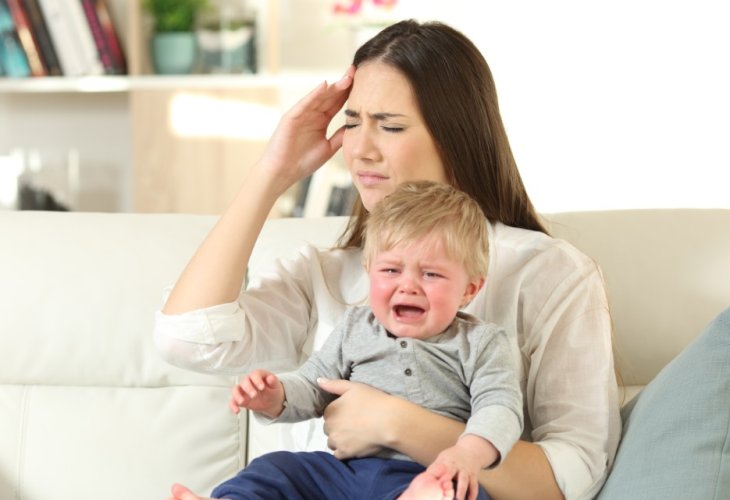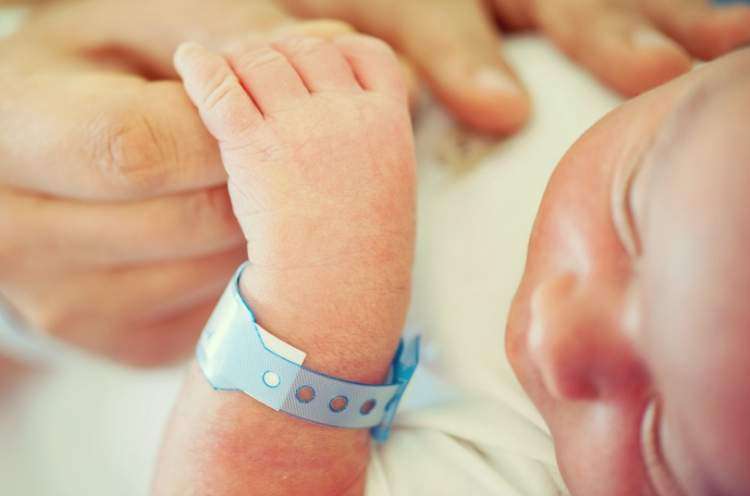Batsheva Adler: "A Woman Can Function at Home and Work, Yet Still Suffer Greatly"
Why do depression and anxiety increase after childbirth? How can one identify postpartum depression? Can it be prevented, and when should professional help be sought? Batsheva Adler, a CBT therapist specializing in postpartum depression, shares sensitive insights into the challenges that no one prepares us for.
 (Photo: shutterstock)
(Photo: shutterstock)I met Batsheva for the first time at one of the significant crossroads of my life. As soon as she started speaking, I knew I needed to follow her and interview her at all costs. So meet Batsheva Adler, 50 years old, residing in Beitar Illit, a mother of 10 children. Formerly a school guidance counselor, she now practices CBT for emotional behavioral therapy, including at the 'Nafshi B'She'alti' department of Hidabroot, specializing in postpartum depression among women.
Before we dive in, Batsheva opens with a preface: "Today, it's very common to talk only about depression that develops after birth, in women, but often it's not just depression. It can manifest as heightened anxiety, compulsiveness, and anything related to this 'family.' It's possible that even before birth or pregnancy, there were low-level anxieties or compulsiveness, and the pressure of childbirth, emotional, mental, and physical, amplified these previously minor phenomena. It used to be talked about as 'are you sad or not?' But what if you have terrible anxieties? That's not depression! A woman can function very well, go to work, and still experience terrible suffering from anxiety or compulsiveness. I had a patient who told me that after sunset, as soon as it gets dark, she starts seeing all sorts of figures and monsters... She didn't have that before childbirth, just 'normal' anxieties like everyone she managed and dealt with. But suddenly after childbirth, it became unbearable. But that's not depression because she functions as usual and even goes to work, but her problem is at night. Therefore, we don't want to call it just 'postpartum depression.'"
 (Photo: shutterstock)
(Photo: shutterstock)Pay Attention to the Soul
So let's talk about this broad field that occurs in women after childbirth and not necessarily depression. Why does it happen, actually? It's often explained as hormonal changes, but is that really the whole story?
"No, today we know it's not just hormonal changes," Adler argues. "Moreover, there's even research that talks about depression in fathers, and surely there it's not hormones. But there's something about childbirth that heightens these phenomena. I'll give you an example of a woman I treated in her tenth childbirth. She was someone who had everything running smoothly, had help from her older children, and wasn't clueless about what lay ahead or double the work in her second time giving birth.
"But suddenly, in the tenth childbirth, that's when the crisis happened. I told her: 'You're pushing and pushing, your battery is weak, flashing, sending you alerts - but you're not paying attention, so there’s a breakdown.' All sorts of things we suppressed suddenly surface after childbirth; sometimes, it can even be an inferiority feeling of 'I'm not succeeding.' You always had that feeling, but suddenly everything collapses, so I truly feel 'defective' or 'unsuccessful.'"
So it can actually happen from physical stress or mental stress?
"Yes, physical and emotional stress can drive you to these areas, but not always. Like everything mental, we have a natural healing mechanism. If it doesn't happen naturally, the problem begins. Let me give you an example: for instance, an accident, or Heaven forbid, a terror attack. Everyone around who saw the scenes is shocked and might not sleep for a few nights. But generally, as time passes, the psyche heals, and we forget. It's not because we don't have a heart or we're emotionless, it's simply the natural way of the world, much like 'a decree on the dead that they will be forgotten.' But who, after a month, can't sleep at night - here, there's a problem. It also happens with physical conditions; there's an example of a bacterium or virus that affects one person, and another who was also exposed - doesn't get infected."
Are there specific characteristics for these women it happens to? Those 'infected,' also emotionally?
"There are risk factors. A woman who neglects herself for a long time, never cares for her needs, and always places herself last on the list - is at increased risk. Even someone who has gone through depression in the past is at increased risk for developing such symptoms again, but if treated - then no, the risk lowers because she receives tools in therapy she can use whenever she feels even just 'down,' preventing the recurrence of depression. Also, the awareness that a woman who has been through it once already knows when she needs help - already reduces the intensity of the risk. It certainly isn't hereditary, so even if your mother suffered from these phenomena, there's no reason for you to worry."
So how do you recognize it? How do we distinguish between depression and a slight melancholy, common in many women after childbirth?
"Very true, post-birth sadness is a common state that happens to almost every woman in the first two weeks after birth. It is a hormonal and natural state that shouldn't cause alarm. Some will struggle with it more, some less, or not at all, but up to two weeks, it's natural and there's no need for concern. There are two parameters to check whether it's within the norm or when it's already crossed the line and requires professional help: duration and intensity. This applies to all mental topics, not just postpartum depression. If the family suffers or the woman suffers alone, in the case of anxieties, for example, and it does not improve despite physical help, or it is seen that over time the woman does not recover, no matter if it’s anxiety, compulsiveness, or depression and there's suffering of the children and family without a functioning mother and it doesn't seem to be getting better with time - then it's advisable to seek professional help."
Is there a way to prevent such situations in advance? Is there a way to ensure they don't happen?
"First of all, there must be awareness from the close environment. The environment must understand that the woman is not a machine and by nature wants to function and be fully present. She would love nothing more in the world than to exit the hard feelings and rejoice with her baby, but those feelings are stronger than her. Moreover, one needs to understand that what is happening right now is not out of pampering or lack of caring, and as soon as she feels capable of doing things - she will do them. Awareness will allow others to offer help, even if more than a couple of weeks have passed since birth."
Batsheva emphasizes that when she talks about 'environment,' she mainly means the husband and those close to the mother, like her mother, sisters, or sisters-in-law. "It's important that the husband should not, Heaven forbid, be angry at his wife for 'not returning to herself and not even being able to start a washing machine,’” she clarifies.
 (Photo: shutterstock)
(Photo: shutterstock)Raising Awareness
Until now, you've talked about the preparation and awareness of a woman's environment. Is there anything a woman herself can do to prevent these situations?
"Yes, absolutely. First of all, almost the same things apply, primarily awareness of her personal needs. So first of all - lower expectations and demands, because when the bar is not met, it creates hard feelings. Furthermore, a woman aware she needs help or even just a listening ear should ensure she gets it. Sometimes a conversation with her husband or with a sister or a good friend can prevent severe depression situations. If a woman knows she needs understanding and help, that's half the solution in hand. Physical help like cleaning, cooked meals, and such can greatly assist and ease the already sensitive situation. Often, it's also the feeling of 'not being alone.'"
And when must a woman seek professional help? When can't you wait for it to pass or just rely on help from the environment?
"It's more accurate to ask – 'What situation requires professional help.' because there are situations where it doesn't matter when they happen - they require immediate professional help. So I'll emphasize intensity. If the suffering is great or accumulated suffering that doesn’t pass, whether it’s depression, anxiety, or compulsiveness, and no matter when it occurs, even in the first two weeks or six months after childbirth - that's a situation that requires professional help."
What does professional help mean? Who should be approached?
"It could even be a family doctor or a gynecologist. They can prescribe simple sedatives that are very common today and don't necessarily require going to a psychiatrist. Maternity nurses can also help and refer to more professional entities."
Why turn to medication already at the first stage? Isn’t it better to try other means first?
"That's true, we recommend medication only if we've tried other things and they weren't sufficient, or for a woman who lacks the energy and patience for therapy that sometimes requires a bit of 'digging' or dedication of time, like conversations, CBT therapy etc. But you can perceive medication simply to consult and check if what I’m feeling is normal, and if it’s normal two months after birth to feel this way. Often, the doctor will say it’s normal or suggest waiting another month and see if the situation improves. Nevertheless, I think knowing that in the worst-case scenario, medication can benefit and resolve the suffering of both the woman and her entire family calms and gives hope even to those who do not cope with emotional treatments, despite such treatments existing that help overcome suffering even without drugs."
You, as a religious woman and a therapist for women with postpartum depression, do you think there's a place in the religious community to talk about these issues?
"I think there's definitely a place and it’s a much-talked-about topic in all communities. If we look at past years, not too many years ago, even 15-20 years back, nobody talked about it at all, not even in health funds or at maternity care. Nowadays, awareness has risen across all sectors, not just the religious community. I receive a lot of feedback from women who express gratitude that the topic is addressed. This shows there's definitely a place for it and even an honorable place because I think a woman deserves to get what she needs, even if she is not depressed or anxious after birth. I think especially because in the religious community, it's common to have 'close' births and large families, it’s important to talk about this, which is sometimes inevitable and not up to the woman at all. Nonetheless, I always like to say there’s hope and in any situation, even if there was no treatment right after birth, it can always be strengthened and never be ashamed to say 'I need help or I'm sad.'"
Suffering from depression, anxiety, and a low emotional state? Contact the "Nafshi B'She'alti" department at Hidabroot. For consultation, call 073-3333331 or email sarap@htv.co.il

